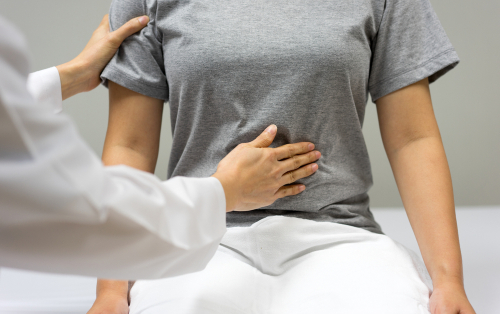
Have you been experiencing stomach pain, bloating, or a change in bowel habits since the pandemic started? If your answer is yes, you may have what some physicians refer to as “pandemic tummy”—digestive symptoms that have developed or become worse through the COVID-19 crisis.
"Stomach issues like heartburn, cramping, abdominal pain, bloating, gas, and diarrhea or constipation are always common,” explains Scott Gelman, MD, a gastroenterologist at Summit Health. “But there does seem to be an uptick in the number of patients coming in for either new or worsening symptoms since the pandemic began.”
The two most common problems Dr. Gelman sees are gastroesophageal reflux disease (GERD) and irritable bowel syndrome (IBS).
- GERD is a common digestive disorder that causes acid and other substances in the stomach to back up into the esophagus. This leads to heartburn, chest pain, indigestion, difficulty swallowing, and regurgitation.
- IBS refers to a chronic group of symptoms, including stomach distress and changes in bowel habits. IBS usually becomes worse after eating and people typically experience periods of both flare-up and relief.
Pandemic tummy is also used to describe the physical appearance of the stomach. Weight gain and loss has been common during quarantine. A survey from the American Psychological Association found that 42 percent of adults have packed on extra pounds.
Causes of Pandemic Tummy
- Stress and anxiety — Mental health has long been known to have a detrimental effect on the stomach. Over the last year and a half, both adults and children have been under extreme psychological duress. In fact, more than three in every 10 adults report their mental health became worse during the pandemic.
“We know that stress contributes to digestive symptoms, particularly those associated with IBS and GERD,” says Dr. Gelman. “For many of my patients, their worries only became worse during quarantine. They described concerns about their health and well-being, job security, social isolation, and their children’s education.”
- Physical and emotional isolation — Being cut off from your peers, coworkers, and extended family members can take a toll on both your mental and physical health. While pandemic tummy can affect anyone, Dr. Gelman has noticed an increase in the number of young patients—late teens and early 20-somethings—who have come in for office visits.
“I think the physical and social isolation hit young people particularly hard,” he says. “At a time when they should be socializing, going to school, playing sports, and participating in activities, they were forced to quarantine at home.”
- Changes in eating, drinking, and exercise habits — Making nutritious meals and getting regular physical activity has been a significant challenge during the COVID-19 crisis. The winter months were particularly difficult for many of Dr. Gelman’s patients. Many individuals reported drinking more caffeine and alcohol. A report from the American Psychological Association found that nearly 1 in 4 adults drank alcohol to help cope with the stress of the pandemic.
“Eating the wrong foods, drinking too much alcohol, relying heavily on caffeine, and gaining weight will make GERD symptoms worse,” explains Dr. Gelman.
The Road Back to Normal
As people begin to return to some form of normalcy, Dr. Gelman says there are many changes you can make to get your health back on track. First, he recommends modifying your diet and returning to a regular exercise program. “Be proactive and start addressing these changes now,” he advises.
Dr. Gelman suggests several specific dietary changes that can improve symptoms of GERD and IBS. They include:
- Reducing foods that are high in fat content, have very spicy ingredients, or contain citrus, chocolate or peppermint.
- Eating smaller meals throughout the day.
- Not lying down for 2-3 hours after your last meal.
- Losing weight if you are overweight or obese.
- Cutting out alcohol and cigarettes.
- Focusing on a low FODMAP diet — a collection of carbohydrates that are not absorbed well by the gut and can trigger IBS symptoms.
In addition to these lifestyle changes, Dr. Gelman also recommends making an appointment with a physician. Over-the-counter medications, including antacids, H2 blockers, and proton pump inhibitors, can be used to treat mild GERD for short periods of time. However, if your symptoms persist for more than a month or so, it is imperative you speak with a specialist.
“If you are requiring continued use of over-the-counter medications to control your symptoms, it is important to follow up with a provider,” explains Dr. Gelman. “IBS and GERD can mimic other illnesses, so it is important to have a thorough evaluation.”
Always consult your doctor before attempting a new diet or starting a new exercise regimen.
